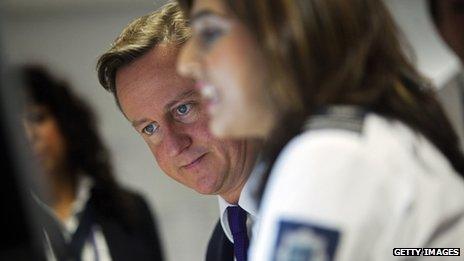Clash over EU migrants and benefits
- Published

David Cameron says 'things have gone badly wrong'
In wanting to restrict the movement and entitlements of migrants UK Prime Minister David Cameron is challenging one of the core principles of the EU - the free movement of people across EU borders.
One commissioner says the moves risk depicting the UK "as the nasty country in the EU".
In part this is a clash between principles and practice.
The EU Commission says that the freedom to move and work in any part of the EU is one of the European project's greatest achievements.
Officials firmly believe that migrants are mainly young and active and pay more in tax than they receive in benefits. They argue that the rules that prevent discrimination against migrants from different EU member states are an integral part of the single market which the UK firmly backs.
"If we start to dismantle some of the rules of the single market... it ends up as a slippery slope," Commissioner Lazslo Andor told the ≥…»ÀøÏ ÷'s Today programme.
Laszlo Andor: There are "existing EU safeguards" against benefit tourism
Mr Cameron, writing in the Financial Times, says "things have gone badly wrong". He says that since 2004 the UK has "witnessed the biggest migration in Europe outside wartime".
Now, politically, he is under enormous pressure because restrictions on Bulgarians and Romanians working in the UK or anywhere else in the EU will be lifted at the start of January.
The prime minister has two targets; one is the threat of new arrivals in the months ahead, and secondly the longer term when and if the EU expands.
In the short-term he says he will change the rules; migrants will not be able to claim out-of-work benefits for the first three months.
After that they will only be able to claim for a maximum of six months unless they can prove they have a genuine prospect of employment. New arrivals will not be able to claim housing benefit.
Mr Cameron says "all of this we can legally do within the limits of the treaties".
Legal tussle
There is much that is unclear however. Will there be new legislation? Will EU officials challenge these changes?
Certainly they will scrutinise any legislation to see whether new criteria for benefits is compatible with EU rules and whether it discriminates against non-British EU workers.
Already the UK and the EU are in a legal tussle over benefits.
The prime minister has also promised to remove those who are begging or sleeping rough. Again it is unclear whether this would involve new legislation. Already - and controversially - the French regularly remove and expel Roma from France.
Then there is the long-term.
Mr Cameron wants to qualify the right to freely move and work. He is talking of withholding that right to new countries until their national income has reached a certain level.
This is, at the moment, just an idea but it will be hugely controversial. One of the attractions for countries in Eastern Europe and beyond is their citizens' ability to move within the EU's 28 countries to find work.
But there are concerns in Germany, the Netherlands, Austria and elsewhere about so-called benefits tourism.
The UK intends to place this at the centre of its demands to reform the EU.
Undoubtedly there will be a debate but Brussels will fight it hard, to defend a core principle that EU nationals can travel and work freely anywhere in the EU.